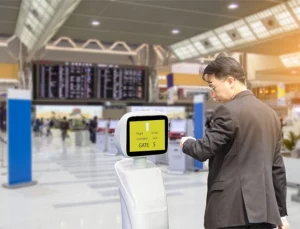- Posted on : April 5, 2021
-
- Industry : Healthcare
- Type: News

The following is an authored article by Radhakrishnan R, that appeared in Silicon India. Follow this link to view the original article.
The integration of technology and adoption of automation tools has always been inevitable. However, when the pandemic forced companies to cut costs, enterprises had to quickly shift to advanced automation technologies, particularly robotic process automation (RPA). In a recent survey by Deloitte, more than 53 percent of organizations have either implemented or started to incorporate RPA for administrative and manual processes. Early adopters of RPA have already realized benefits such as reduced operational costs, improved process turnaround time and enhanced work efficiency.
Robotic process automation, recognized as one of the most widely adopted automation capabilities, simulates repetitive human tasks such as logging into applications, entering tons of data, and sending emails.
In India, the market for RPA is scaling at an unprecedented level in traditional industries, government systems and service sectors. According to Kenneth market research report, India’s RPA market is expected to grow at a CAGR of above 20.0 percent during the forecast period 2019-2025.
Let’s take a closer look at how RPA is transforming business across sectors:
Retail
Whether it is brick-and-mortar stores or e-commerce, time consumption and the scope of human errors are serious concerns in the retail industry. However, with RPA, administrative processes such as assigning shifts, measuring time and attendance, auditing sales and leave management can be facilitated more productively. Furthermore, RPA in retail also supports office tasks such as payroll, training, onboarding, staff selection, health, and safety.
Retail is essentially a human-driven industry, with customer interaction to demand-supply planning all completed manually. Now with RPA in the retail sector, retailers can easily automate demand-supply planning and make data-driven decisions for asset management, customer support, and supplier management.
In the eCommerce category, customer support is now an integral part of the retail industry. To ensure consumer delight, retailers must provide 24×7 customer support and send real-time updates. By implementing an RPA bot, companies can ensure an efficient customer support service. The software bot can also be configured to address simple user queries and give the sales team feedback.
Healthcare
Today, healthcare technologies include digital operations, with efficiency and accuracy the top focus areas. In order to achieve this acceleration in operations, Robotic Process Automation can be an immense help.
Apart from streamlining processes, RPA can be leveraged by hospitals to improve patient care by simplifying patient appointment scheduling, streamlining discharge instructions, and improving treatment cycles.
Healthcare organizations can use RPA software to extract and optimize patient data more effortlessly. When communicating with other digital systems, the software can manipulate this data to generate analytics that offers valuable insights to hospitals allowing them to make accurate diagnoses and provide tailored treatments to patients. The McKinsey Report, The era of exponential improvement in healthcare, highlights RPA as an emerging automation technology that would completely revamp the current healthcare system.
Allowing RPA to handle business processes will not only enhance clinical workflows but will return coveted time to staff and allow tailored treatments for patients.
Insurance
The insurance industry relies heavily on enormous data collected both electronically and on paper. In such a scenario, implementing RPA can unlock a myriad of business benefits, including the automation of manually intensive processes like complex error tracking, claim verification, extraction of data, integration of claim relevant data sources, and more. It consequently speeds up the process and reduces employee workloads.
In addition, Insurance companies leverage RPA to design customer journeys from scratch rather than simply replicating existing ones with more processing efficiency. RPA improves the customer experience and leads to a more fulfilled human staff.
An insurance company can make their processes efficient by tracking them, which can be achieved easily by implementing RPA. All the processes handled by RPA can be tracked and recorded at each step, providing the company with details such as transactions processed, exceptions encountered, etc. Thus, RPA can empower insurers to build a high-growth and responsive business while optimizing their costs.
The Next Step
With technology embracing any role where data and a set of rules are involved, RPA is expanding its roots exponentially across sectors, whether it’s retail, healthcare, or finance. According to Gartner's latest report, global robotic process automation (RPA) software revenue is projected to reach $1.89 billion in 2021, an increase of 19.5 percent from 2020.
The increasing applications of RPA have paved the way for many new job roles including RPA Process Developer, Production Manager, and RPA Process Analyst. This technology has great potential for growth across India. In the near future, education providers and companies will work together toward creating the necessary knowledge pool to fulfill industry needs.






